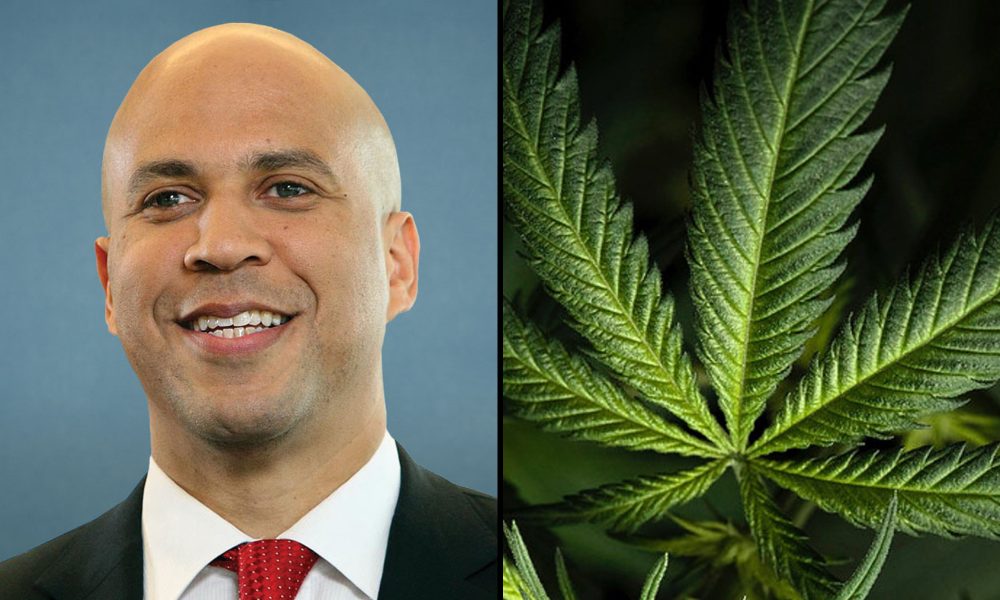Sen. Cory Booker (D-NJ) says that federal marijuana prohibition has created a “twin crisis” where people are still being arrested over cannabis in many states while, elsewhere, state-legal businesses are being locked out of financial services, compromising equity.
The senator released a video on Friday that underscores the consequences of the policy disconnect and stresses the need to enact reforms such as the marijuana legalization bill he filed in July with Senate Majority Leader Chuck Schumer (D-NY) and Senate Finance Committee Chairman Ron Wyden (D-OR).
“Federal marijuana prohibition is beginning to be more and more absurd, especially because most states now have moved to legalize marijuana, whether it’s for medical use or for overall adult use,” Booker said. “And now we have a twin crisis” of cannabis criminalization and a lack of access to the banking system for marijuana businesses.
The federal prohibition of marijuana is out of step with what the American people, across the political spectrum, want and makes a mockery of equal justice.
State after state is legalizing marijuana, but federal law is holding back small businesses from thriving. pic.twitter.com/FJ7ayatjqu
— Cory Booker (@CoryBooker) September 23, 2022
While Booker described the banking issue in terms of equity implications, explaining how small business owners have struggled to compete without a means of obtaining loans and other services that are available to traditional industries, he didn’t mention a package of legislation that Schumer is putting together in consultation with bipartisan and bicameral offices.
The in-formation proposal, which is colloquially known as SAFE Plus, is expected to contain cannabis banking protections, as well as other incremental reforms like expungements, veterans medical cannabis access and more.
Booker recently said that he expects the bill to be introduced sometime during the lame duck session after the November midterms. But in the new videos, he only talks about the broad legalization legislation as a solution to the “twin crisis,” despite the expectation that it does not have enough support to advance through the Senate.
The senator has been adamant about the need to holistically end prohibition first before taking the incremental step of freeing up financial services for the industry, but he’s increasingly signaled that he’s willing to compromise in order to get some level of reform enacted this session.
In the new video, he said that part of the problem under the status quo is that small marijuana businesses are being priced out of the market, allowing large multi-state operators to acquire them—a trend of consolidation that’s causing the industry to become “woefully not diverse.”
I have been working and leading on these issues for years. I hope you will join me in these efforts. We must end federal marijuana prohibition.
— Cory Booker (@CoryBooker) September 23, 2022
“We are not seeing the kind of democratizing force many of us hoped that marijuana legalization would be, so now we need to move on the federal level,” Booker said.
He said that the Cannabis Administration and Opportunity Act (CAOA) would “bring about a true end to this decades-long prohibition of marijuana that allows states more freedom and has important provisions of restorative justice to help make sure that small business people can access business loans and to help people get their records expunged and more.”
Booker released the video on the same day that he virtually participated in a cannabis conference in Pennsylvania, with state lawmakers and officials like Lt. Gov. John Fetterman (D), a U.S. Senate candidate running on a pro-legalization platform.
The senator emphasized there that lawmakers have a “historic opportunity right now for our country to rectify past wrongs and to create a more just [and] fair America with more opportunity.”
Sources familiar with the state of negotiations over SAFE Plus have signaled that the bill drafting is fairly far along.
The House sponsor of the standalone marijuana banking bill says he recently spoke with Schumer at an event at the White House and discussed the need to enact the bipartisan reform this session.
Rep. Ed Perlmutter (D-CO) said that he impressed upon the leader the importance of his Secure and Fair Enforcement (SAFE) Banking Act, which has cleared the House in some form seven times only to be held up in the Senate under Republican and Democratic control. Schumer, the congressman said, assured him that the chamber is “working on it” and is “going to get going” on the reform.
The conversation between Schumer and Perlmutter happened at an event on inflation reduction and happened to coincide with the National Cannabis Industry Association (NCIA) lobby days, with over 100 marijuana business leaders on Capitol Hill to push for the passage of the SAFE Banking Act.
—
Marijuana Moment is tracking more than 1,500 cannabis, psychedelics and drug policy bills in state legislatures and Congress this year. Patreon supporters pledging at least $25/month get access to our interactive maps, charts and hearing calendar so they don’t miss any developments.![]()
Learn more about our marijuana bill tracker and become a supporter on Patreon to get access.
—
Perlmutter said at an NCIA-organized press conference that he’s increasingly tempted to “go to the nuclear option” in the House Rules Committee of “holding up” separate legislation like the National Defense Authorization Act (NDAA) in order to get the marijuana banking measure enacted.
The congressman and Sen. Jeff Merkley (D-OR), the Senate sponsor of the SAFE Banking Act, also outlined next steps for the cannabis banking reform at a briefing organized by the U.S. Cannabis Council (USCC) in July.
Cannabis Regulators of Color Coalition (CRCC) released a paper in August that outlined what they view as shortcomings of the standalone SAFE Banking Act and recommended several amendments to bolster its equity impact.
Booker said at an event organized by CRCC that the standalone legislation “requires changes” if it’s going to advance before cannabis is federally legalized.
The senator initially signaled that he was coming around to marijuana banking reform (contingent on equity provisions) at a Senate Judiciary subcommittee hearing in July that he convened as chairman.
Meanwhile, Perlmutter also said in a recent interview that he feels the introduction of the Senate legalization bill alone means that lawmakers have overcome a legislative “hurdle” that’s kept SAFE Banking from advancing in the chamber.
Last week, the National Association of State Treasurers (NAST) agreed to reaffirm its support for a resolution calling on Congress to enact a federal marijuana banking fix.
A recent poll found that Republican voters are on board with a number of marijuana reform proposals—from medical cannabis legalization to expungements for prior marijuana convictions to letting states set their own policies without federal interference.
According to a poll from Independent Community Bankers of America (ICBA) that was released this month, a majority of American voters (65 percent) support allowing banks to work with state-legal marijuana businesses—and most people believe it will both improve public safety and promote social equity.
The survey results are consistent with the findings of a separate poll from the American Bankers Association (ABA) that was released in March. It also showed that 65 percent of Americans back the marijuana banking reform.
Separately, the non-partisan National Conference of State Legislatures (NCSL) recently voted to adopt a revised policy directive that expresses support for federal marijuana descheduling and cannabis banking reform amid the state-level legalization movement.
Meanwhile, a key congressional committee approved a series of criminal justice reform bills last week—including bipartisan proposals to clear records for prior federal marijuana convictions, provide funding for states that implement systems of automatic expungements and codify retroactive relief for people incarcerated due to on crack-cocaine sentencing disparities.
Wisconsin Governor’s Push To Allow Ballot Initiatives Could Put Marijuana Legalization Before Voters
Medical Disclaimer:
The information provided in these blog posts is intended for general informational and educational purposes only. It is not a substitute for professional medical advice, diagnosis, or treatment. Always seek the advice of your physician or other qualified healthcare provider with any questions you may have regarding a medical condition. The use of any information provided in these blog posts is solely at your own risk. The authors and the website do not recommend or endorse any specific products, treatments, or procedures mentioned. Reliance on any information in these blog posts is solely at your own discretion.






